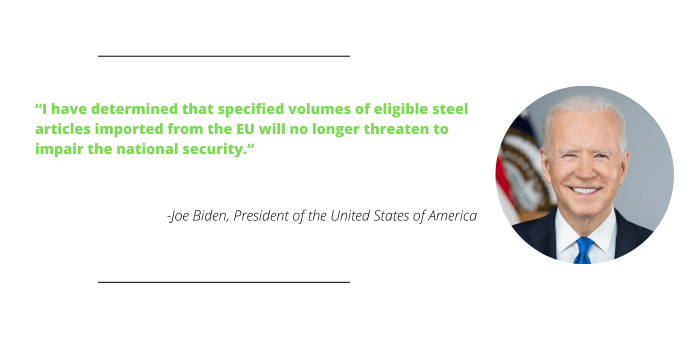The U.S. is extending a suspension of tariffs on steel and aluminum against the European Union for two years through 2025.
- The suspension continues to allow time for the two sides to negotiate a long-term solution.
- The tariffs on the EU were initially put in place during the Trump administration.
A New Lifeline For Steel Trade
The tariffs date back to 2018 when the Trump administration placed numerous high tariffs on steel and aluminum, primarily motivated by cheap Chinese imports that might hurt U.S. production.
- This expanded to tariffs on EU imports.
- The EU – typically an ally and trade partner with the U.S. – applied retaliatory sanctions on goods from the U.S.
- Many of the tariffs placed during this period have been controversial based on the way they have impacted U.S. businesses that import and export with affected countries.
When President Biden took office in 2021, he did not remove the tariffs, but quickly granted a suspension on those for EU exporters.
- That suspension was due to expire at the end of 2023.
In December, the EU announced that it was suspending its own retaliatory tariffs claiming that “intensive engagement” with the United States had been taking place surrounding trade conversations.
- Soon after, the White House announced that the suspension would be extended until December 31, 2025.

“I have determined that specified volumes of eligible steel articles imported from the EU will no longer threaten to impair the national security,” Biden said in a statement.
U.S. Trade Representative Katheine Tai says that the extension allows the two sides to “continue negotiations on a forward-looking high-standard arrangement” and maintains “predictability and stability to steel and aluminum workers and their families on both sides of the Atlantic.”
Promo Perspective
A number of promotional products incorporate steel and aluminum, such as popular tumblers.
In general, importing from Europe can often be more costly than other sources, but European countries represent a potential market for promotional products made in the U.S. including those made with steel and aluminum.
- While the tariffs have not been removed, the EU’s decision to suspend retaliatory tariffs allows U.S. businesses to export steel and aluminum products to European countries.
- The cited “intensive engagement” between the two sides potentially bodes well for the possibility of the suspension eventually turning into a removal of the tariffs altogether.
Additionally, the U.S. Trade Representative (USTR) announced a further extension of “Section 301” tariff exclusions on certain Chinese imports until May 31, 2024.
- This came after PPAI joined Americans For Free Trade, a broad coalition of hundreds of organizations representing U.S. businesses in requesting the USTR extend the tariff exclusions, which were set to expire December 31.


